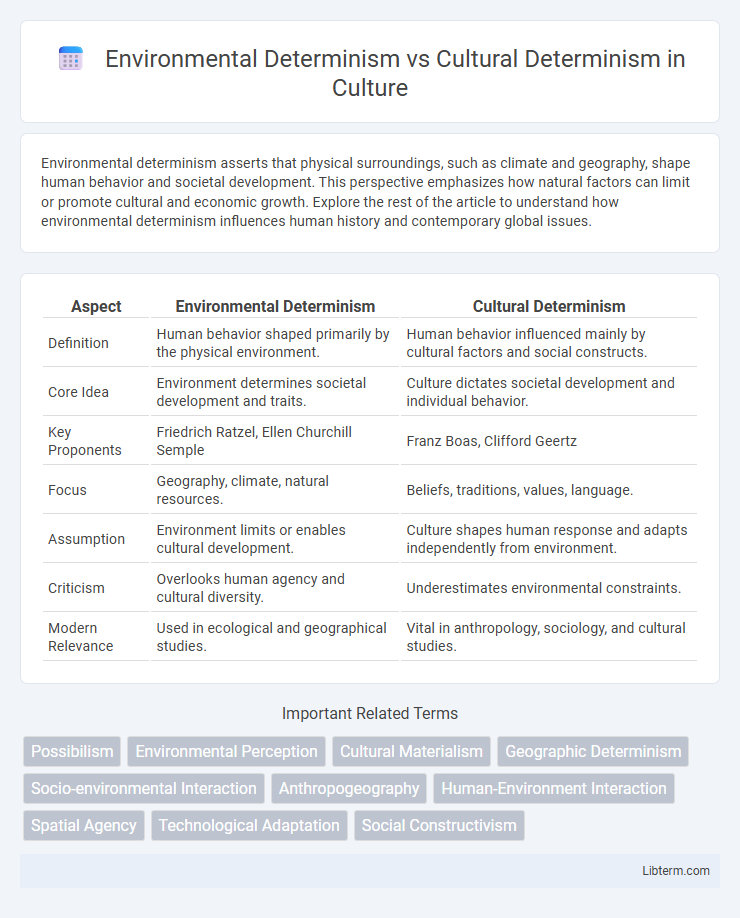Environmental determinism asserts that physical surroundings, such as climate and geography, shape human behavior and societal development. This perspective emphasizes how natural factors can limit or promote cultural and economic growth. Explore the rest of the article to understand how environmental determinism influences human history and contemporary global issues.
Table of Comparison
| Aspect | Environmental Determinism | Cultural Determinism |
|---|---|---|
| Definition | Human behavior shaped primarily by the physical environment. | Human behavior influenced mainly by cultural factors and social constructs. |
| Core Idea | Environment determines societal development and traits. | Culture dictates societal development and individual behavior. |
| Key Proponents | Friedrich Ratzel, Ellen Churchill Semple | Franz Boas, Clifford Geertz |
| Focus | Geography, climate, natural resources. | Beliefs, traditions, values, language. |
| Assumption | Environment limits or enables cultural development. | Culture shapes human response and adapts independently from environment. |
| Criticism | Overlooks human agency and cultural diversity. | Underestimates environmental constraints. |
| Modern Relevance | Used in ecological and geographical studies. | Vital in anthropology, sociology, and cultural studies. |
Introduction to Environmental and Cultural Determinism
Environmental determinism asserts that physical geography and climate directly shape human behavior, culture, and social development, emphasizing the environment's role in limiting possibilities. In contrast, cultural determinism argues that human culture, values, and social constructs primarily influence human actions and societal progress, independent of environmental constraints. Understanding these perspectives is crucial for analyzing how natural conditions and cultural factors interplay to affect human evolution and regional differences.
Historical Background of Deterministic Theories
Environmental determinism emerged in the late 19th and early 20th centuries, grounded in the belief that physical geography and climate directly shape human societies and behaviors. Prominent geographers such as Friedrich Ratzel and Ellsworth Huntington argued that environmental factors like temperature and terrain dictated cultural development and societal success. Cultural determinism arose as a reaction, emphasizing that human culture, traditions, and social structures hold primary influence over environmental conditions and human adaptation, challenging the deterministic role of geography alone.
Key Principles of Environmental Determinism
Environmental determinism posits that geographic and climatic conditions directly shape human behaviors, societal development, and cultural patterns. Key principles emphasize that natural environments impose limitations or provide opportunities, influencing agricultural productivity, settlement locations, and economic activities. This approach asserts that physical surroundings act as primary determinants in the evolution of civilizations and social structures.
Core Concepts of Cultural Determinism
Cultural determinism emphasizes that human behavior and societal development are primarily shaped by cultural factors such as beliefs, values, norms, and social institutions rather than environmental conditions. It asserts that culture influences individuals' perceptions, decision-making processes, and interactions, making it a key driver in shaping identities and social organization. This perspective contrasts with environmental determinism by prioritizing cultural diversity and human agency in adapting to and transforming surroundings.
Major Proponents and Criticisms
Environmental determinism, championed by scholars like Friedrich Ratzel and Ellen Churchill Semple, argues that physical geography shapes human culture and societal development. Cultural determinism, supported by anthropologists such as Franz Boas and Ruth Benedict, contends that cultural practices and social norms primarily influence human behavior and adaptation, irrespective of environmental factors. Criticisms of environmental determinism highlight its reductionism and geographical determinism, often ignoring human agency, while cultural determinism is critiqued for underestimating environmental constraints and overemphasizing cultural autonomy.
Case Studies: Impact on Societal Development
Environmental determinism emphasizes how geographical features and climate shape societal development, as seen in Jared Diamond's analysis of Eurasian agricultural societies benefiting from fertile lands and domesticated animals. Cultural determinism highlights internal social values and practices influencing progress, illustrated by Max Weber's study linking Protestant work ethic to economic growth in Western Europe. Case studies comparing the Nile River civilization's reliance on predictable flooding with Japan's cultural emphasis on harmony showcase differing impacts of environment and culture on societal evolution.
Environmental vs Cultural Influences: Comparative Analysis
Environmental determinism argues that physical geography and climatic conditions shape human behavior and societal development, emphasizing the influence of natural factors such as terrain, weather patterns, and resource availability. Cultural determinism centers on the idea that human culture, including traditions, beliefs, and social norms, plays a critical role in guiding human actions and societal evolution, independent of environmental constraints. Comparative analysis reveals that while environmental factors set the stage for potential human activities, cultural influences actively modify and sometimes override environmental limitations, resulting in diverse societal outcomes across similar geographic contexts.
Implications for Modern Geography and Anthropology
Environmental determinism emphasizes the impact of physical geography on human behavior and societal development, guiding modern geography's analysis of climate, terrain, and resources in shaping cultures. Cultural determinism highlights human agency, stressing that cultural values, beliefs, and innovations drive societal progress, influencing anthropological studies on identity and social structures. Integrating both perspectives informs a nuanced understanding of human-environment interactions, critical for sustainable development policies and cross-cultural research in contemporary geography and anthropology.
Contemporary Debates and Emerging Perspectives
Contemporary debates on Environmental Determinism versus Cultural Determinism highlight the shift towards integrative approaches that emphasize the dynamic interaction between ecological factors and human agency. Emerging perspectives prioritize interdisciplinarity, incorporating insights from geography, anthropology, and sociology to address how climate change, technological innovation, and globalization reshape cultural practices and environmental adaptations. Researchers increasingly challenge deterministic binaries by exploring complex feedback loops between environment and culture, promoting nuanced frameworks such as cultural ecology and political ecology.
Conclusion: Towards a Holistic Understanding
Environmental determinism and cultural determinism each provide partial insights into human behavior by emphasizing the roles of natural surroundings and societal influences, respectively. A holistic understanding emerges by integrating these perspectives, recognizing that environmental factors and cultural contexts interact dynamically to shape human development and social structures. Embracing this interdisciplinary approach enhances the analysis of human geography, anthropology, and social sciences, fostering more comprehensive explanations of human adaptation and innovation.
Environmental Determinism Infographic

 libterm.com
libterm.com